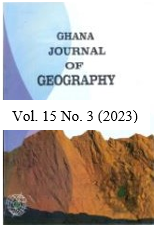Domestic Water Conservation in the Federal Capital Territory of Nigeria: Perceptions and Practices
Abstract
Many regions in Nigeria currently experience physical or economic water scarcity; a situation that is expected to worsen because of the nation’s rapid population growth, which has resulted in increased pressure on available freshwater resources. This study, therefore, examines water conservation practices in the Federal Capital Territory (FCT), one of the fastest-growing areas in Nigeria. A questionnaire was administered to 649 respondents, from across the six Area Councils that make up the Territory. The findings revealed that water investments in the FCT have not yielded 100% public water supply coverage for residents. About half of the respondents (48.7%) reduced their water use by minimizing the water used for washing, and a slightly higher proportion (53.5%) minimized water used for bathing. While rain harvesting was the most widespread conservation practice, with 65.3% of the respondents adopting it, the least practised conservation method is wastewater reuse, where only about 41% of the respondents adopted it. Although the majority of the respondents were literates, education did not impact their conservation practice. The age and gender of respondents played no significant role in the adoption of conservation practices. More public awareness and water education are needed to promote greater domestic water conservation among residents.




